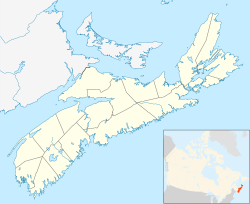

3.7miles
V a l l e y
N e c k
The Annapolis Basin is a sub-basin of the Bay of Fundy, located on the bay's southeastern shores, along the northwestern shore of Nova Scotia and at the western end of the Annapolis Valley.
Contents
The basin takes its name from the Annapolis River, which drains into its eastern end at the town of Annapolis Royal. The basin measures approximately 24 kilometres (15 mi) northeast-southwest and 6 kilometres (3.7 mi) at its widest from northwest to southeast.
It is a sheltered and mostly shallow water body, framed by the ridges of the North Mountain and South Mountain ranges of the Annapolis Valley; the basin is geologically a continuation of the valley floor. A break in the North Mountain range at the northwestern edge of the basin, called Digby Gut, provides an outlet to the Bay of Fundy.
The Bay Ferries Limited ferry service operating across the Bay of Fundy between Digby and Saint John maintains a terminal on the western shore of the basin near the Digby Gut.
